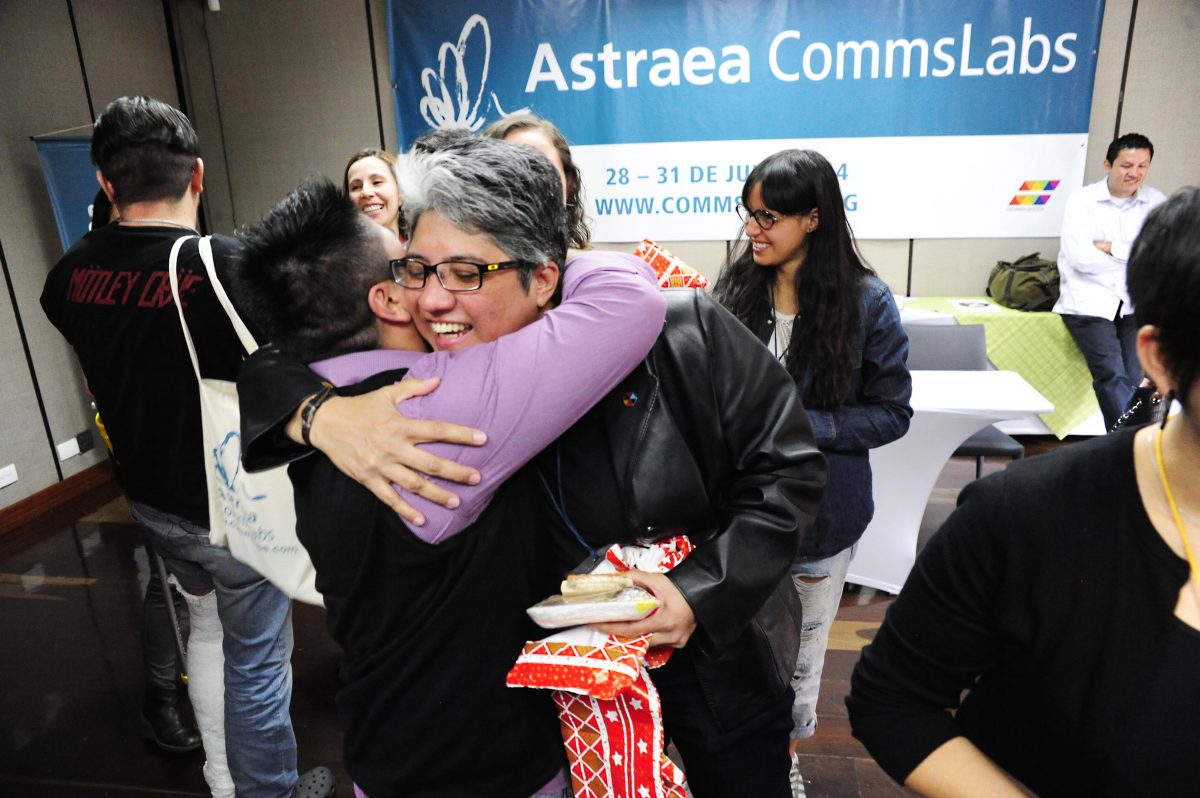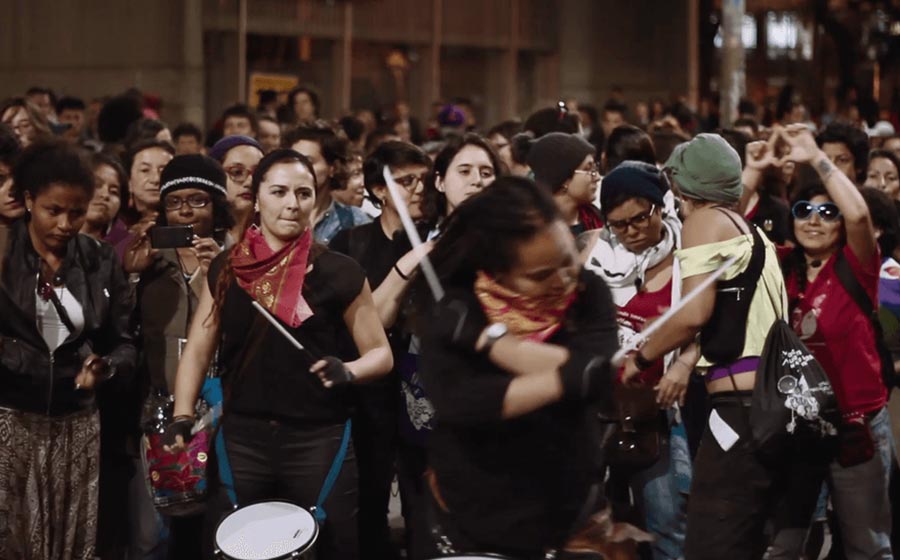Location: Bogota
4.710989, -74.072092
Mesa Joven por la Diversidad Sexual
TRANS-SER – Red de Apoyo a Transgeneristas
Corporación Triangulo Negro
Behind the Lens: Grantee Partners at Work
Astraea and our grantee partners recognize the power of art to create social change. Through our Global Arts Fund and threaded throughout our work, we showcase and connect art by LGBTQI people and organizations that use art as a tool for social transformation.
Astraea and our grantee partners recognize the power of art to create social change. Through our Global Arts Fund and threaded throughout our work, we showcase and connect art by LGBTQI people and organizations that use art as a tool for social transformation. Spanning multiple genres, our grantee partners’ exemplary work has been acknowledged by Sundance, the American Film Institute and the Museum of Modern Art.
Film holds a unique role in social change. As lesbian experimental filmmaker Barbara Hammer writes, “I chose film and video as a medium to make the invisible, visible… I want people to leave the theater with fresh perceptions, emboldened to take active and political stances for social change in a global environment.”
Watch From Home
The New Black (Dir. Yoruba Richen)
 Stream The New Black on Netflix.
Stream The New Black on Netflix.
Directed, produced and written by Global Arts Fund panelist Yoruba Richen, this documentary offers a comprehensive look at “how the African-American community is grappling with the gay rights issue in light of the recent gay marriage movement and the fight over civil rights.” The New Black utilizes a decade’s worth of newsreel footage and features interviews with prominent Black voices from both sides of the marriage equality debate. Read more about this gripping documentary.
Mujeres al Borde (Colombia)
 Stream documentaries by Mujeres al Borde on Vimeo.
Stream documentaries by Mujeres al Borde on Vimeo.
Founded in 2001, grantee partner Mujeres al Borde (Women in the Margins) uses cultural production and community building to promote the rights of women and LGBT communities. Mujeres al Borde coordinates the Audiovisual Regional School, Al Borde. Open to all women and LGBT people, Al Borde produces short films about LGBT activists in South America. These have been screened and awarded at 30 film festivals across the globe, including the Queer Women of Color Festival and the Venezuelan Film Festival of Diversity. Learn more about Mujeres al Borde’s mission to raise visibility through film.
Iranti-Org (South Africa)
 Stream Iranti’s short documentaries on YouTube.
Stream Iranti’s short documentaries on YouTube.
Grantee partner Iranti-Org formed in 2012 to help local and regional lesbian, trans, intersex and gender non-conforming (LTIGNC) movements in South Africa and across the continent use media as a platform for mobilization and shifting public dialogue. Iranti supports organizations to document human rights violations and produce evidence-based materials, including short YouTube documentaries about violence against LGBT people in South Africa. Read about Iranti-Org’
Summer 2015 Update

The national consciousness about racial, economic and gender inequality has been raised by radical organizing…
Movement building has been a core commitment of Astraea’s since our inception. When other funders shied away from supporting this work thinking it didn’t yield immediately measurable outcomes, Astraea was vigilant. There is nothing coincidental about the intersections of wins and organizing we are experiencing in this country and globally: they are a culmination of years of movements building. The barrage of vitriol and violence emerging on the popular level reveals the systemic injustice that makes specific lives untenable, whilst simultaneously laying bare how ready and poised we are for a grassroots response. Police brutality and systemic injustice is not a surprise: it’s a strategy. The tectonic shift happening in the streets, on the page, virtually and literally is not a singular moment or a coincidence. It is the strategic rise of our movements. It is through this lens that we take a glimpse at what has happened (so far!) this summer.
How is this movement taking shape in the United States?

The national consciousness about racial, economic and gender inequality has been raised by radical organizing, a time that also marks the two year anniversary of #BlackLivesMatter. Our community of grantee partners, staff, donors and board members are present in those spaces because of our viable and interconnected ecosystem. Folks continue to show up in the streets to protest the continued killings of Black people by police as well as the systemic violence against queer & trans* communities of color. Grantee partner groups like SONG and Familia joined with the #Not1More campaign to release queer & trans* migrants from detention and put an end to deportations. Through the new forms of collective organizing like the #GetYrRights network, theyre working to build strong communities, promoting healing from trauma & violence and taking a stand to end harmful immigration enforcement practices.
Leading in progressive philanthropy to create world-first funding

Astraea made history recently by launching the first-ever Intersex Fund in the world. The fund is a stellar example of the power of a single investment. We secured a significant seed donation from Kobi Conaway and Andrew Owen, and a leadership gift from the Arcus Foundation, which we then leveraged to bring the Funds total to nearly $500,000. By identifying funding gaps and working in partnership with activists, we are providing essential resources to severely underfunded communities. Philanthropic advocacy in action! Our International Fund continued to support new & emerging intersectional LGBTQI activism through 131 grants in 56 countries with over $2 million. An exciting new example is our increasing support for activism led by and for LGBTQI youth. We’re funding groups like Togetherness for Equality and Action (TEA), an LBT-led grassroots group based outside of Bangkok. TEAworks with traditionally marginalized youth from Muslim and queer communities to share stories from LGBT youth, while organizing leadership programs and training in human rights data collection and analysis, social media and self-care.
Using creativity to organize

Artist-activists are imagining new tactics, strategies and visions for the world. This summer, the Astraea Global Arts Fund awarded grants to 15 artists and arts collectives who are producing work in response to criminalization and militarization in their local contexts. We are proud to build on our 37 year legacy of supporting activist artists!
Producing groundbreaking research
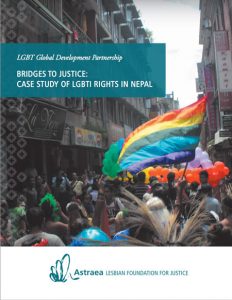
In June we released the groundbreaking research document: Bridges to Justice & Nepal Case Study. The case study sparks questions about how to encourage, research, and fund activism to improve the lives of LGBTI people globally. Over the past year and half, Astraea worked with researchers, activists, and allies in Nepal to document the powerful and creative movement-building by LGBTI people. Nepal is home to Asia’s first openly-gay federal elected official and is a global leader in implementing the Yogyakarta Principles. The recent earthquake compounds the challenges LGTBQI people face and makes the findings of the study even more critically relevant.
Reimagining the next generation of LGBTQI human rights advocacy
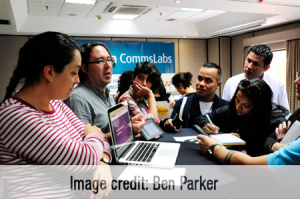
Our CommsLabs initiative continues to thrive. These gatherings are designed with, by and for LGBTQI activists, and build upon a shared vision of strengthening a network of human rights defenders and technologists working together to further LGBTQI advocacy through communications and technology. In April we held a planning workshop with local activists and technologists from Eastern and Southern Africa, to imagine and co-create the next African CommsLabs. Scheduled for November 2015.
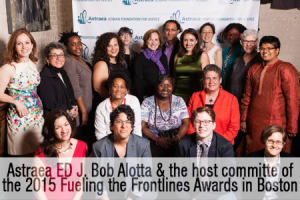
July marks the halfway point in our three year, $20 million fundraising campaign, Fueling the Frontlines. Because of your generosity and commitment, we have raised $11.2M of our total goal, enabling us to continue building and resourcing true social change. Astraea’s Fueling the Frontlines Awards, held in Boston in May 2015, went a long way toward helping us reach our financial milestone, while allowing us to recognize three extraordinary women who have furthered the movement locally and nationally: Elyse Cherry (CEO of Boston Community Capital); Daunasia Yancey (Co-leader of Black Lives Matter: Boston), and the late political scientist and author Jean Hardisty. Midway through 2015, we remain ever-vigilant in our collective insistence for gender, racial and class equality. As we take stock of our successes we also look forward to the continued work in our backyards, across nations and around the world! Come along for the ride!
CommsLabs Colombia: Defending Human Rights Through Media and Technology
In July 2014 Astraea launched the first-ever Media, Communications and Technology Lab (Comms- Labs) in Bogotá, Colombia, as part of the LGBT Global Development Partnership with USAID. Gathering together more than 35 activists from Latin America with 12 technologists and communications practitioners from around the world, the group worked together to create new media strategies and digital advocacy tools specifically designed to meet the needs of LGBT human rights defenders.
At the CommsLabs in Colombia, Astraea grantee Red Lésbica CATTRACHAS, a collective whose main objective is to advance and protect the human rights of LGBT people in Honduras, presented their Observatorio tool. The Observatorio is a database that CATTRACHAS has used since 2008 to monitor and identify trends in human rights violations and violence against LGBT people; it works by grabbing tagged words (murder, gay, homicide, lesbian) from online newspapers and media outlets.
CATTRACHAS then follows up, opens a case and provides support with reporting and services for the survivors. Astraea grantee partners Colombia Diversa, Caribe Afirmativo and Santamaría Fundación were also present at the CommsLabs. These organizations have been collaborating with CATTRACHAS since 2011, using the Observatorio to track human rights violations in Colombia. Together they’ve built a robust system that allows them to monitor violence and hate crimes against the LGBT community. Other organizations, such as No Tengo Miedo, a Peru-based grantee partner, and Mujer y Mujer, an Ecuador-based grantee partner, learned about the Observatorio and its regional impact for the first time at CommsLabs, and have made plans to implement it in their countries. As a direct result of the CommsLabs, CATTRACHAS strengthened the Observatorio with support from one of the trainers, and was able to make it available online for other organizations to use.
Astraea 2014 Highlights
This was another radical year for Astraea and the movement for LGBTQI justice. As we stand at the brink of 2015, these are some of our 2014 highlights.
Broke grantmaking records. 2014 has been our biggest grantmaking year yet. We made nearly $3 million in grants to 81 partners in 35 countries.


Kika Child, CommsLabs Colombia, 2014. Participants exchange gifts. Photo: Ben Parker
Four-star rating from Charity Navigator. Astraea received a four-star rating from Charity Navigator, America’s largest and most-utilized independent evaluator of charities. The ratings, which are assessed annually, take into account organizational governance practices, fiscal management and commitment to accountability and transparency. It was the highest score of any national LGBTQI organization awarded.
 Left: Vernita Gray. Right: The 1993 Lesbian Writer’s Fund Awards Gala,
Left: Vernita Gray. Right: The 1993 Lesbian Writer’s Fund Awards Gala,
Pictured left to right: Cheryl Clarke, Leslie Feinberg, Minnie Bruce Pratt, event emcee Karen Williams, and Cheryl Neal Reed
Intersectional organizing to end state violence. Astraea grantee partners are collectively organizing mass action to end state violence. #BlackLivesMatter is an intersectional movement, led by African American people and queers. Many of Astraeas grantee partners have helped amplify and lead these waves of change. BreakOUT! and the New Orleans Workers Center for Racial Justice organized a Childrens March for Human Rights on October 24th. Streetwise and Safe (SAS) organized a #GetYrRights tweeter rally to bring attention to the power of knowing your rights when interacting with the police as LGBTQ youth. Southerners on New Ground (SONG) coordinated #BlackLivesMatterEverywhere actions with other community organizations and blocked a busy highway in Atlanta, Georgia in honor of the 19th annual National Day of Protest Against Police Brutality. Astraea continues to partner with Communities United for Police Reform(CPR) campaign to end discriminatory policing practices in New York.
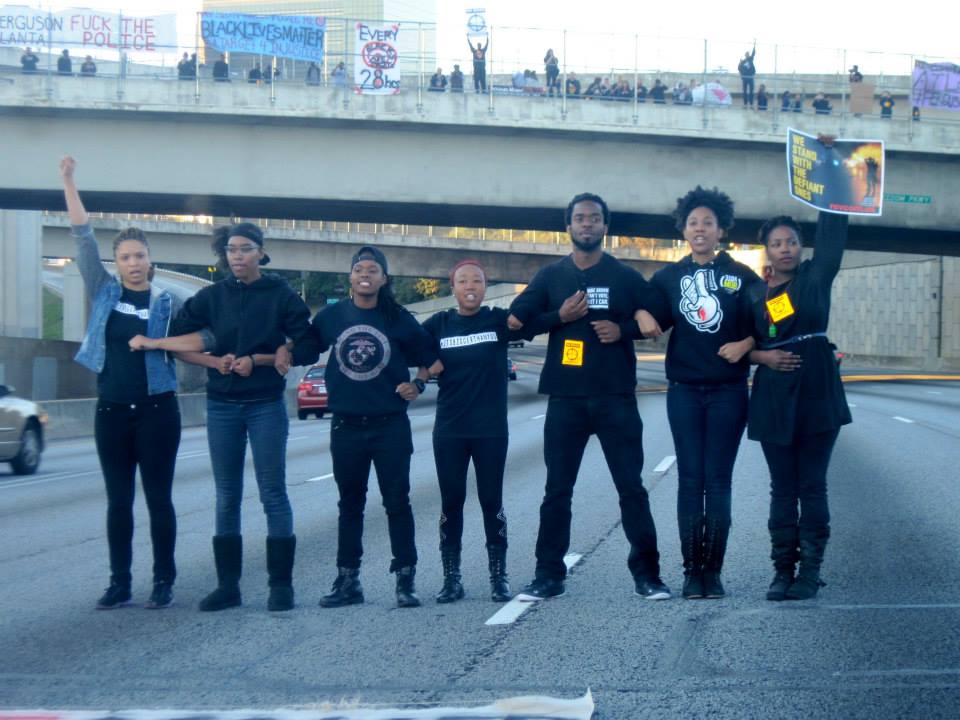
Southerners on New Ground. #BlackLivesMatter Action ATL GA Photo: Lorraine Fontana
Sexual Orientation and Gender Identity (SOGI) wins across the globe.
- UN human rights body condemned violence and discrimination on the basis of sexual orientation and gender identity
- Cuba banned employment discrimination
- In Ecuador, 450 public servants in the health and judicial sector received training on SOGI non discriminatory practises
- In the United States, President Barack Obama signed an executive order to protect LGBT workers
- Australia passed the first non-discrimination law protecting intersex people.
- The African Commission on Human and People’s Rights passed a resolution condemning violence based on SOGI
- In Kenya and Peru the court legalized trans* name changes and supported individual rights to self determination.
- Secured partial adoption rights for same sex couples in Colombia
- Achieved a seventh resolution on LGBTI rights in Latin America.
Trans* rights gained momentum. But we have a long way to go. The Indian Supreme Court officially recognized a third gender, paving the way for access to improved state welfare. 10,000 people gathered in Istanbul for the largest Trans* Pride March ever, despite increased attempts by the state to repress protests since Gezi. Actress Laverne Cox became the first trans* person to appear on the cover of TIME magazine. However, violence against trans* folks and women of color in particular persists. The IDAHOT 2014 update reveals a total of 1,509 reported killings of trans and gender variant people in 61 countries worldwide from January 1st 2008 to March 31st 2014.
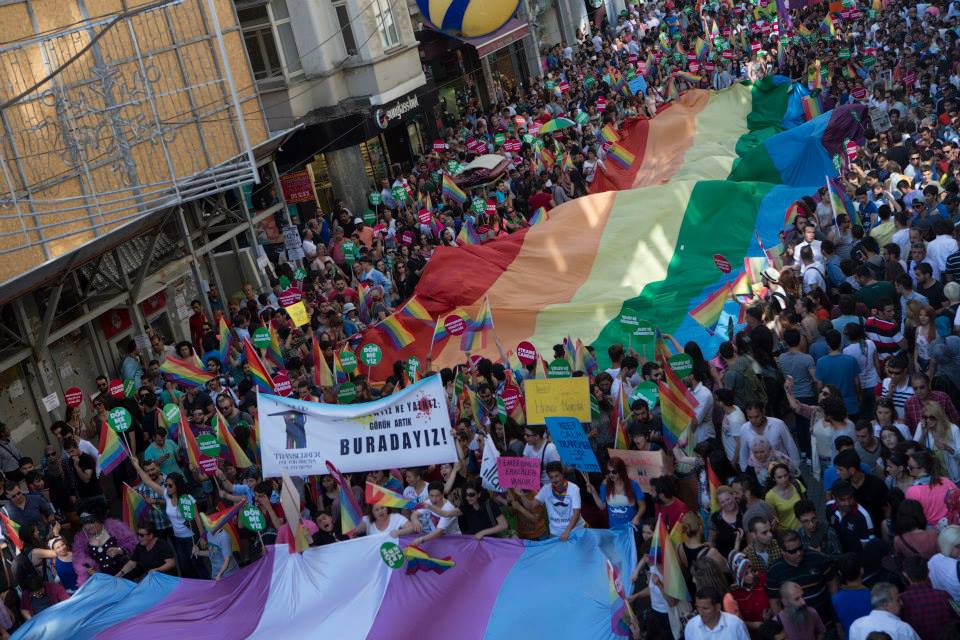
Istanbul Trans* Pride March 2014. Photo: Yasin AKGUL Astraea, grantee partner Instanbul LGBTT
Marriage equality reached a tipping point. 2014 will be recognized as the tipping point for marriage equality in the US. 35 States legalized same-sex marriage, just over 60 percent of the U.S. population now lives in a state where marriage equality is legal.
Africans celebrated wins despite the increasing sanctioned homophobia on the continent – Uganda held the first pride rally after the ‘abominable’ anti-gay law was overturned. Astraea grantee partners Freedom and Roam Uganda lead a constitutional challenge to the anti-homosexuality bill along with public education and media advocacy in Uganda.
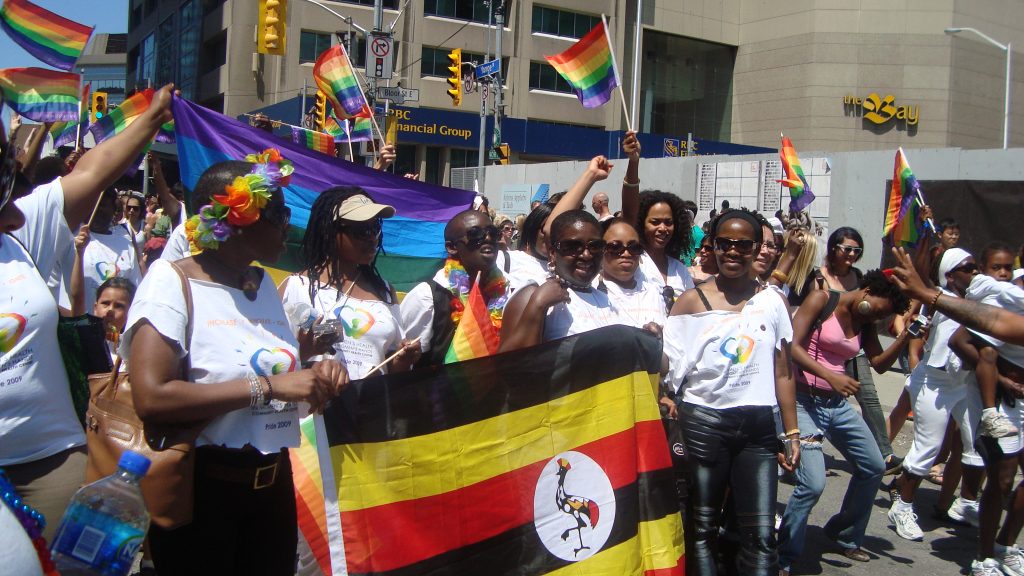
Freedom and Roam Uganda at Uganda Pride. Photo: Molisa wa NyaKale
In 2015, we stand at the nexus of a movement for justice, recognizing that the fight for gender, racial and class equality is one we are deeply committed to. Help us support brilliant and brave LGBTQI activists on the frontlines of our communities’ struggles for liberation. Here’s to another year in this gorgeous struggle.
Batucada Feminista La Tremenda Revoltosa
The feminist batucada La Tremenda Revoltosa is a collective composed of 20 feminist percussionists, most of them Afro-Colombian lesbians, who are committed to social transformation.
The feminist batucada La Tremenda Revoltosa is a collective composed of 20 feminist percussionists, most of them Afro-Colombian lesbians, who are committed to social transformation. They believe that the revolution will happen if people take it to the streets and believe that music inspires revolution. Through percussion and its activism in the streets, they advocate for dignity and against oppression, violence and silence.
*** En Español***
La batucada feminista La Tremenda Revoltosa es un colectivo compuesto por 20 percusionistas feministas, en su mayoría lesbianas afrocolombianas, que están comprometidas con la transformación social. Cree que la revolución se dará si la gente la saca a las calles y cree que la música inspira a la revolución. A través de la percusión y su activismo en las calles, aboga por la dignidad y en contra de la opresión, la violencia y el silencio.
10 LGBTQI Activist Moments of 2013
At Astraea Lesbian Foundation for Justice, the last days of the year are a time to honor brave leaps forward and take stock of political set backs for LGBTQI rights activism in 2013. By no means comprehensive, we offer a brief survey of ten moments of LGBTQI activism around the globe in 2013. Join the conversation online and share more moments with us on facebook and twitter using #LGBTQIActivistMoments!
At Astraea Lesbian Foundation for Justice, the last days of the year are a time to honor brave leaps forward and take stock of political set backs for LGBTQI rights activism in 2013. By no means comprehensive, we offer a brief survey of ten moments of LGBTQI activism around the globe in 2013. Join the conversation online and share more moments with us on facebook and twitter using #LGBTQIActivistMoments!
 1. Edith Windsors win for Marriage Equality: the Defense of Marriage Act is declared unconstitutional by U.S. Supreme Court. Federal recognition is afforded to same-sex marriages performed under state law. The U.S. becomes one of a handful of countries pushing same-sex marriage forward.
1. Edith Windsors win for Marriage Equality: the Defense of Marriage Act is declared unconstitutional by U.S. Supreme Court. Federal recognition is afforded to same-sex marriages performed under state law. The U.S. becomes one of a handful of countries pushing same-sex marriage forward.
 2. In a set back in Colombia, the nations same-sex marriage bill failed to pass the Senate and bypass coalition opposition led by the Attorney General. Legal ambiguity remains, however, with constitutional recognition of legal registry in effect. Couples can approach notaries or judges to marry, but their requests remain in the hands of officials who can deny them.
2. In a set back in Colombia, the nations same-sex marriage bill failed to pass the Senate and bypass coalition opposition led by the Attorney General. Legal ambiguity remains, however, with constitutional recognition of legal registry in effect. Couples can approach notaries or judges to marry, but their requests remain in the hands of officials who can deny them.
 3. Years of policy advocacy, movement building, and direct action by LGBTQI activists of color produced hard-fought victories for immigration rights in California. The city of San Francisco passed an ordinance limiting the Secure Communities program (S-Comm), effectively reducing the threat of deportation to anyone arrested by local police. And the state of California passed the Trust Act, prohibiting local law enforcement agencies from detaining people for deportation if arrested for a minor or non-violent crime and are otherwise eligible to be released from custody.
3. Years of policy advocacy, movement building, and direct action by LGBTQI activists of color produced hard-fought victories for immigration rights in California. The city of San Francisco passed an ordinance limiting the Secure Communities program (S-Comm), effectively reducing the threat of deportation to anyone arrested by local police. And the state of California passed the Trust Act, prohibiting local law enforcement agencies from detaining people for deportation if arrested for a minor or non-violent crime and are otherwise eligible to be released from custody.
 4. New York City Council passed the Community Safety Act, winning New Yorkers protection from the New York Police Departments stop-and-frisk policy. Simultaneously, Federal Judge Shira Scheindlin issued a decision declaring stop-and-frisk as practiced by the NYPD unconstitutional. While this ruling was appealed by Mayor Mike Bloomberg’s administration, Mayor-Elect Bill DeBlasio has pledged to drop this appeal and it remains to be seen exactly how these new protections against police abuse will be enacted.
4. New York City Council passed the Community Safety Act, winning New Yorkers protection from the New York Police Departments stop-and-frisk policy. Simultaneously, Federal Judge Shira Scheindlin issued a decision declaring stop-and-frisk as practiced by the NYPD unconstitutional. While this ruling was appealed by Mayor Mike Bloomberg’s administration, Mayor-Elect Bill DeBlasio has pledged to drop this appeal and it remains to be seen exactly how these new protections against police abuse will be enacted.
 5. Ugandan LGBTI advocacy groups made collective strides pinpointing American evangelist involvement in anti-gay persecution in Uganda. The U.S. court case “Sexual Minorities Uganda vs. Scott Lively” moved forward while the Ugandan parliament unexpectedly passed its Kill the Gays bill.
5. Ugandan LGBTI advocacy groups made collective strides pinpointing American evangelist involvement in anti-gay persecution in Uganda. The U.S. court case “Sexual Minorities Uganda vs. Scott Lively” moved forward while the Ugandan parliament unexpectedly passed its Kill the Gays bill.
 6. Cuban lawmakers approve a proposal to ban employment discrimination based on sexual orientation.
6. Cuban lawmakers approve a proposal to ban employment discrimination based on sexual orientation.
 7. LGBTQI activism swelled after Indias Supreme Court upheld a colonial-era law, Section 377 of Indias penal code, and recriminalized same-sex relations. The Courts decision overruled a previous ruling of 377 as unconstitutional by the Delhi High Court, and severely set back LGBTQI human rights protections in India.
7. LGBTQI activism swelled after Indias Supreme Court upheld a colonial-era law, Section 377 of Indias penal code, and recriminalized same-sex relations. The Courts decision overruled a previous ruling of 377 as unconstitutional by the Delhi High Court, and severely set back LGBTQI human rights protections in India.
 8. LGBTQI human rights activists in Russia witnessed a show of support around the winter Olympic games in Sochi. Activists called for action, reporting heightened LGBTQI violence since the Russian government passed an anti-gay propaganda law and conducted nationwide raids of nongovernmental organizations to identify “foreign agents” earlier in the year. International advocacy efforts include Billie Jean King, Brian Boitano, and other gay athletes joining a U.S. delegation to the Olympics.
8. LGBTQI human rights activists in Russia witnessed a show of support around the winter Olympic games in Sochi. Activists called for action, reporting heightened LGBTQI violence since the Russian government passed an anti-gay propaganda law and conducted nationwide raids of nongovernmental organizations to identify “foreign agents” earlier in the year. International advocacy efforts include Billie Jean King, Brian Boitano, and other gay athletes joining a U.S. delegation to the Olympics.
 9. In a unanimous 9-0 ruling, Canada’s Supreme Court decriminalized sex work offering constitutional protections to sex workers’ health and safety.
9. In a unanimous 9-0 ruling, Canada’s Supreme Court decriminalized sex work offering constitutional protections to sex workers’ health and safety.
 10. Guyana courts upheld a partial ban on cross-dressing deeming it illegal if done for “improper purposes.” LGBTQI rights groups in Guyana including Society Against Sexual Orientation Discrimination rallied to appeal the judgment to protect transgender people from being persecuted by 120-year-old law.
10. Guyana courts upheld a partial ban on cross-dressing deeming it illegal if done for “improper purposes.” LGBTQI rights groups in Guyana including Society Against Sexual Orientation Discrimination rallied to appeal the judgment to protect transgender people from being persecuted by 120-year-old law.

